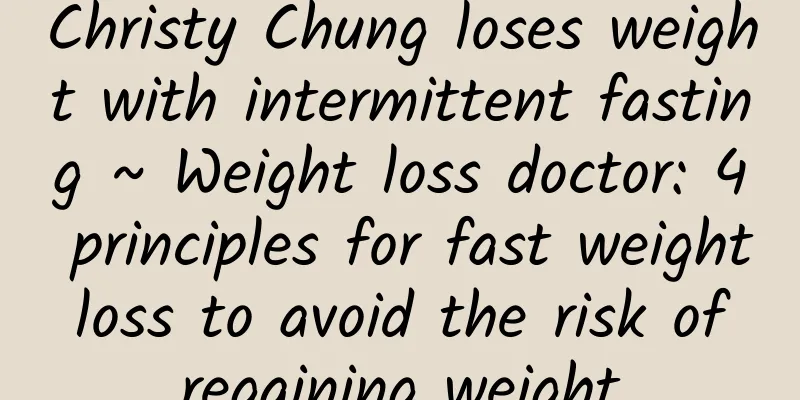Christy Chung loses weight with intermittent fasting ~ Weight loss doctor: 4 principles for fast weight loss to avoid the risk of regaining weight

|
Female artist Christy Chung revealed that she successfully lost 10 kilograms by using the "intermittent fasting method", which sparked heated discussion online. Doctors point out that intermittent fasting, also known as light fasting, mainly restricts calorie intake to reduce weight. However, there are 4 major principles that need to be mastered, otherwise there is a risk of gaining weight again. Christy Chung, known as the "Mermaid Princess" and "the most beautiful goddess", has lost a lot of shape after turning 50. Recently, it was reported that she successfully lost weight by using the "intermittent fasting method". It is reported that Christy Chung adopts the 8:16 time control method, which means that she eats all three meals within 8 hours of a day and fasts for the rest of the time. Liu Bowen, executive director of the Taiwan Obesity Education and Prevention Association and a weight loss specialist, pointed out that there are a lot of weight loss recipes in the market, and many people use various fasting therapies, or light meals of less than 1,000 calories a day to lose weight. In fact, fasting therapies or light fasting methods can cause considerable harm to the body. Intermittent fasting may lead to weight gain There are currently three popular intermittent fasting methods. They are: 5:2 intermittent fasting method (eating normally for 5 days in a week and intermittent fasting for 2 non-consecutive days). 16:8 light fasting method (eating time is concentrated within 8 hours a day, for example, you can eat from 9 am to 5 pm, and then fast for 16 hours), 6:1 light fasting method (light fast 1 day a week, and eat normally for the other 6 days). The dietary principles are to choose high-quality protein, more fruits and vegetables, low-glycemic index foods and vegetable oils, drink plenty of water, etc., and choose 2 non-consecutive days in a week to eat only 500 to 600 calories on that day. This can help you lose weight temporarily, but this type of rapid weight loss is not suitable for everyone and still poses many health risks. Slow metabolism increases risk of chronic diseases Liu Bowen, a famous weight loss doctor, emphasized that because the body is fasting, in addition to the originally stored fat being mobilized and consumed, the protein that is responsible for maintaining physiological functions and immune capabilities will also be consumed. Therefore, people with poor metabolic function should not try it easily to avoid affecting their health. Especially once the metabolism slows down, the basal metabolic rate will also decrease, which hides the risk of weight gain. Growing children and teenagers, pregnant women, the elderly, people with gout and diabetes, and cancer patients should not try this as it may affect their growth and development or cause sarcopenia due to insufficient eating at an older age, or even cause hypoglycemia in diabetic patients or worsen cancer. 4 principles for healthy weight loss with small and frequent meals Basically, losing weight and maintaining health do not necessarily rely on intermittent fasting. If you reduce your calories by 500 calories a day, such as exercising for 1 hour to burn 200 calories, and eat one less bowl of rice (about 280 calories) a day, you can lose 0.5 to 1 kg in a week, and it will be more sustainable. In addition, intermittent fasting mainly reduces the overall calorie count, rather than changing the body's metabolic balance. Once there is insufficient physical activity, the weight loss effect will be compromised. Therefore, doctors recommend that you adopt intermittent fasting, which can be done in the form of small and frequent meals, avoiding concentrating on one meal, in order to reduce hunger throughout the day. At the same time, master the following 4 principles to lose weight healthily and avoid gaining weight again. 1. Choose high-quality protein and low-glycemic index foods: Eggs, fish, chicken breast, tofu, soy milk, etc. are all high-quality proteins. As for staple foods, you can eat whole grains, such as whole wheat toast, buckwheat noodles, sweet potatoes, etc., which will give you a sense of fullness and prevent your blood sugar from rising too quickly after eating. 2. Eat more dietary fiber such as vegetables and moderate amounts of fruit: Vegetables are generally low in calories and can be eaten in large quantities as long as they are cooked correctly. On the other hand, fruits are high in calories, so you still need to pay attention to the amount you consume. At the same time, chew slowly to delay hunger. 3. Cook food with monounsaturated fatty acids: add olive oil for seasoning. Moderately increasing dietary fat can help delay gastric emptying and allow food to stay in the stomach to delay hunger. 4. Water and minerals: It is very important to maintain adequate intake of water and minerals. During intermittent fasting days, be sure to drink plenty of water. |
Recommend
How long will the abdominal pain of ectopic pregnancy last and how should it be treated?
Ectopic pregnancy can cause abdominal pain, vagin...
What are some ways to prevent cervicitis?
The symptoms of cervicitis mainly include increas...
Don't let pelvic fluid take away your pregnancy
Don't let pelvic effusion cause infertility. ...
How to perform surgery for uterine fibroids? Dietary care methods after uterine fibroid surgery
In recent years, as people's pace of life con...
Do you often not eat enough vegetables? While greens are cheap, make hot cabbage and chicken breast salad
Crisp and refreshing, very satisfying Cabbage is ...
Uncover the causes of cervical hypertrophy and be a healthy woman
What are the causes of cervical hypertrophy? Cerv...
Beyonce chili lemon juice weight loss fat can not be eliminated
In order to show their best side, both men and wo...
What are the main causes of cervicitis?
Cervicitis is a common gynecological disease, mai...
What to do about pelvic pain caused by endometriosis
What to do if you have pelvic pain caused by endo...
How much does Yuting emergency contraceptive pills cost?
The price of each drug is different. Many people ...
What medicine is good for women with irregular menstruation? Traditional Chinese medicine symptomatic treatment of irregular menstruation
Menstrual irregularities occur from time to time ...
What are the ways to cure dysmenorrhea?
Dysmenorrhea is a phenomenon that most women have...
Is it good to boil water with mugwort to treat cervical erosion? These methods can also be used to treat cervical erosion
Mugwort is a traditional Chinese medicine. Becaus...
Losing weight also depends on your personality. Which of the five types of weight loss personalities are you?
If you copy someone else's weight loss method...
How can women prevent cervical erosion? Women should keep in mind 5 points to stay away from cervical erosion
Cervical erosion, mild cases often have no obviou...









